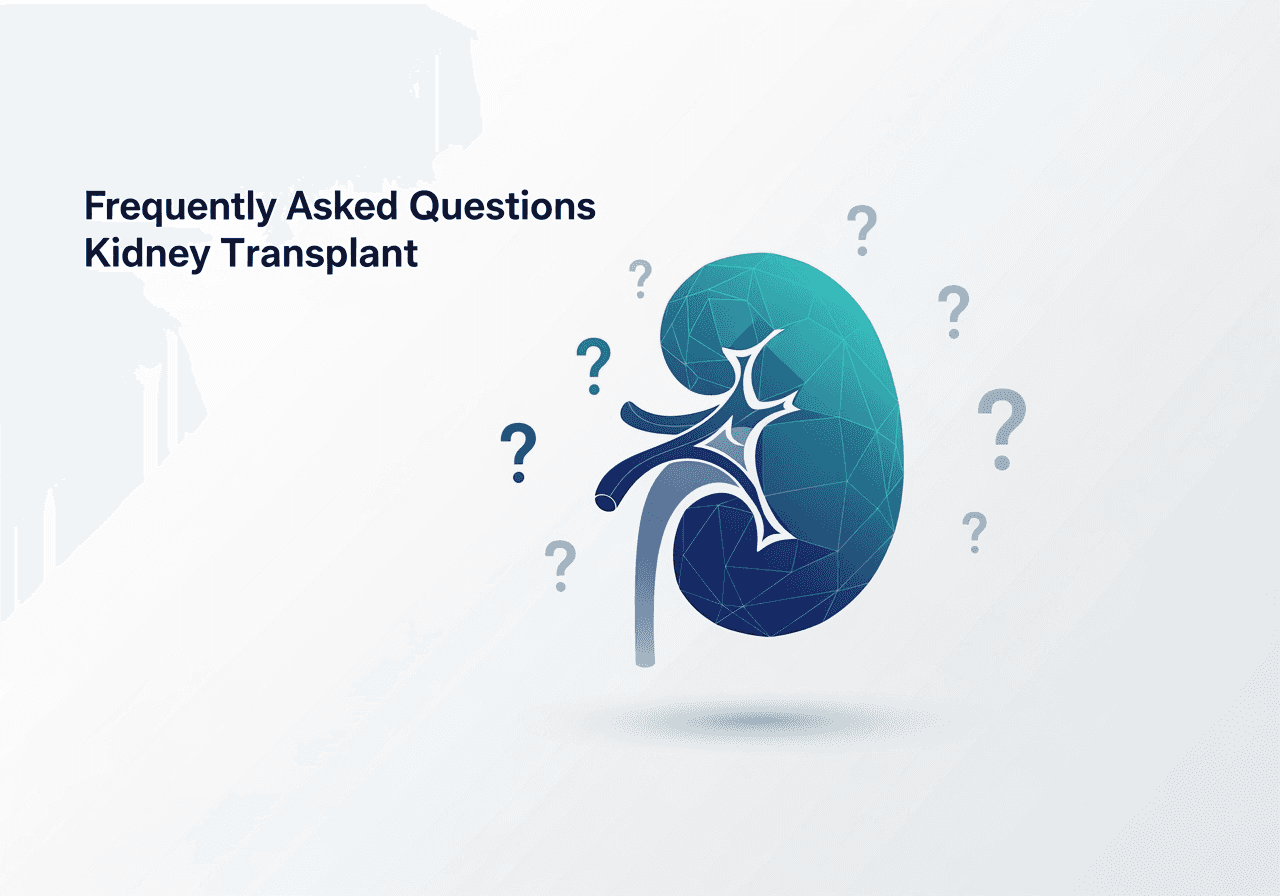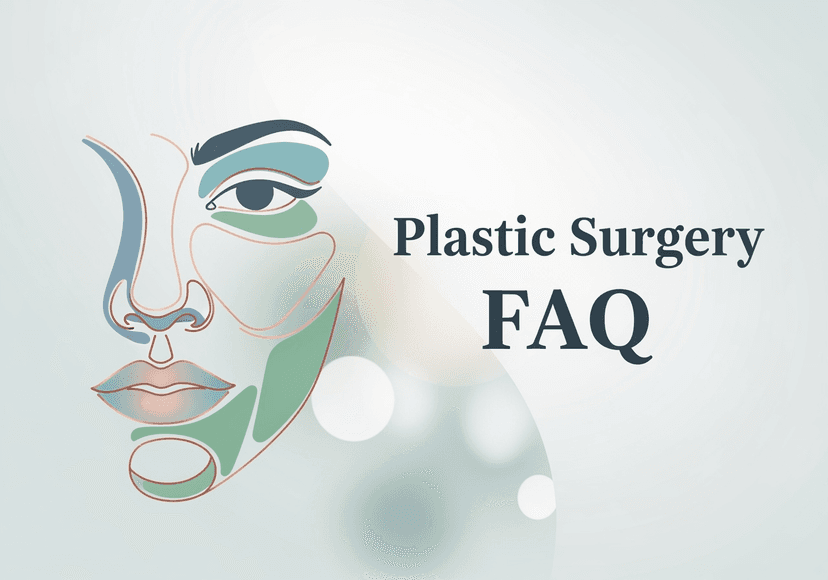
Frequently Asked Questions About Kidney Transplant
30 Oct, 2025
 Healthtrip
Healthtrip- Who Needs a Kidney Transplant?
- Where Can I Get a Kidney Transplant?
- Why is a Kidney Transplant Necessary?
- How Do I Prepare for a Kidney Transplant?
- What to Expect During and After a Kidney Transplant?
- What are the Risks and Complications of a Kidney Transplant?
- Kidney Transplant Success Rate: Factors and Statistics < li>Conclusion
What is a Kidney Transplant?
A kidney transplant is a surgical procedure where a healthy kidney from a donor is placed into a person whose kidneys have failed. Think of it as replacing a faulty engine in a car with a brand-new one! When your kidneys aren't working correctly, waste and excess fluid build up in your body, leading to serious health problems. A transplanted kidney takes over the job of filtering your blood, helping you live a healthier, more active life. Kidney transplants offer a chance to get off dialysis, which can be time-consuming and restrictive. Now, you might be wondering, "Where do these kidneys come from?" Well, they can come from deceased donors (people who have passed away and donated their organs) or living donors (people who choose to donate one of their kidneys). Living donation is particularly amazing because it's an act of incredible generosity that can save a life. If you're exploring kidney transplant options, hospitals like Fortis Memorial Research Institute, Gurgaon and Memorial Sisli Hospital offer comprehensive transplant programs, with skilled surgeons and dedicated support teams. At Healthtrip, we can help you find the perfect medical team and facility to guide you through this journey.
Most popular procedures in India
Who is a Good Candidate for a Kidney Transplant?
Determining who is a "good candidate" for a kidney transplant is a complex process, involving a thorough evaluation by a transplant team. It's not just about having kidney failure; doctors consider your overall health, medical history, and ability to adhere to a post-transplant treatment plan. Generally, ideal candidates are those with end-stage renal disease whose health isn't severely compromised by other conditions. The transplant team assesses factors like heart health, liver function, and the presence of any active infections or cancers. They also want to ensure you're emotionally and mentally prepared for the transplant journey; it can be quite a roller coaster! A crucial aspect is your commitment to taking immunosuppressant medications after the transplant. These drugs prevent your body from rejecting the new kidney, but they also come with potential side effects. So, it's essential to understand the risks and benefits involved. Remember, a kidney transplant isn't a cure, but it can significantly improve your quality of life. If you're wondering where to start, Healthtrip can connect you with transplant centers like Quironsalud Hospital Murcia and Saudi German Hospital Cairo, Egypt, where experienced specialists can evaluate your eligibility and guide you through the process.
Wellness Treatments
Give yourself the time to relax
Lowest Prices Guaranteed!

Lowest Prices Guaranteed!
What are the Different Types of Kidney Transplants?
When it comes to kidney transplants, knowing the different types can help you understand your options better. The most common distinction is between deceased donor transplants and living donor transplants. A deceased donor transplant involves receiving a kidney from someone who has recently passed away and whose family has consented to organ donation. These kidneys are carefully matched to recipients based on blood type, tissue type, and other factors to minimize the risk of rejection. On the other hand, a living donor transplant involves receiving a kidney from a living person, often a family member, friend, or even an altruistic stranger. Living donor transplants have several advantages, including shorter waiting times, better kidney function after the transplant, and the opportunity to schedule the surgery at a time that works best for both the donor and recipient. Within living donor transplants, there are also variations like laparoscopic donor nephrectomy, a minimally invasive technique for removing the donor kidney, which results in less pain and a faster recovery. Some centers, like Memorial Bahçelievler Hospital, specialize in these advanced techniques. Healthtrip can assist you in exploring both deceased and living donor options, connecting you with transplant centers that offer the best approach for your specific needs.
What is the Kidney Transplant Process?
The kidney transplant process is a multi-stage journey that requires careful planning and coordination. It begins with an initial evaluation to determine if you're a suitable candidate, which involves medical tests, physical exams, and psychosocial assessments. Once you're approved, you're placed on a waiting list if you're seeking a deceased donor kidney. If you have a living donor, the process can move forward more quickly. When a compatible kidney becomes available, you'll be contacted and asked to come to the transplant center immediately. The surgery itself usually takes several hours, during which the new kidney is placed in your lower abdomen and connected to your blood vessels and bladder. After the transplant, you'll spend several days or weeks in the hospital, where you'll be closely monitored for any signs of rejection or complications. You'll also start taking immunosuppressant medications to prevent your body from attacking the new kidney. Regular follow-up appointments are crucial after discharge to monitor your kidney function and adjust your medications as needed. The transplant team will provide you with detailed instructions on how to care for yourself and your new kidney. Fortis Escorts Heart Institute and Vejthani Hospital are well-known for their comprehensive post-transplant care programs, and Healthtrip can help you connect with these facilities for seamless support.
What are the Risks and Complications of a Kidney Transplant?
Like any major surgery, a kidney transplant comes with certain risks and potential complications. One of the biggest concerns is rejection, where your body's immune system recognizes the new kidney as foreign and tries to attack it. Immunosuppressant medications help prevent rejection, but they can also weaken your immune system, making you more susceptible to infections. Infections are indeed another significant risk after a kidney transplant, ranging from common colds to more serious infections like pneumonia or urinary tract infections. Other potential complications include bleeding, blood clots, surgical wound problems, and side effects from immunosuppressant medications, such as high blood pressure, high cholesterol, and an increased risk of certain cancers. It's essential to be aware of these risks and to discuss them thoroughly with your transplant team. They can help you understand how to minimize your risk and manage any complications that may arise. They'll also closely monitor your health and adjust your medications as needed. While the risks are real, it's worth remembering that kidney transplants are generally very successful, and the benefits often outweigh the risks. Hospitals like NMC Specialty Hospital, Al Nahda, Dubai and Yanhee International Hospital have extensive experience managing these complications and ensuring the best possible outcomes for their patients. Healthtrip can help you find a center where you feel confident and supported.
What is the Recovery Process Like After a Kidney Transplant?
The recovery process after a kidney transplant is a marathon, not a sprint! You'll likely spend a week or two in the hospital initially, as your medical team monitors your new kidney function and adjusts your medications. Expect to feel tired and sore at first. Pain management will be a priority. As you recover, you'll gradually increase your activity level. Walking is highly encouraged. Regular follow-up appointments are crucial. They help your team keep an eye on your kidney function. They can also adjust your immunosuppressant medication dosages to minimize side effects and prevent rejection of the transplanted kidney. Taking your medications exactly as prescribed is super important in the recovery process. Also, you need to adopt a healthy lifestyle. This will include a balanced diet, regular exercise, and avoiding smoking. You will also need to limit alcohol consumption. It's normal to experience emotional ups and downs during recovery. Lean on your support system: family, friends, and support groups. Transplant centers like Helios Klinikum Erfurt and Hisar Intercontinental Hospital offer comprehensive support programs. These provide guidance and connect you with other transplant recipients. Healthtrip can help you locate resources and hospitals nearby that focus on post-operative care.
How Long Will a Transplanted Kidney Last?
The lifespan of a transplanted kidney varies from person to person. It depends on factors like the donor's health, the recipient's overall health, how well the recipient adheres to their medication regimen, and any complications that may arise. On average, a kidney from a deceased donor lasts 10-15 years, while a kidney from a living donor tends to last longer, often 15-20 years or more. Of course, some transplanted kidneys may last much longer, while others may fail sooner. It's important to have realistic expectations and to understand that kidney transplantation isn't a permanent cure; it's a treatment that can significantly improve your quality of life and extend your lifespan. Even if a transplanted kidney eventually fails, you can still return to dialysis or consider another transplant. Regular monitoring and adherence to your medical team's recommendations are crucial for maximizing the lifespan of your transplanted kidney. BNH Hospital and Taoufik Clinic, Tunisia provide ongoing support and monitoring to help patients maintain their kidney health. Do not hesitate to reach out to Healthtrip and ask for assistance.
What is the Cost of a Kidney Transplant, and What Financial Assistance is Available?
The cost of a kidney transplant can be substantial, encompassing pre-transplant evaluations, the surgery itself, hospital stay, immunosuppressant medications, and long-term follow-up care. The exact cost varies depending on the transplant center, the type of transplant (living donor vs. deceased donor), and any complications that may arise. It's essential to have a clear understanding of the costs involved and to explore all available financial assistance options. Many insurance plans cover kidney transplants, but it's crucial to verify your coverage and understand any out-of-pocket expenses, such as deductibles, co-pays, and co-insurance. Some transplant centers offer financial counseling services to help you navigate the insurance process and explore other funding sources. Government programs, such as Medicare and Medicaid, may also provide coverage for kidney transplants for eligible individuals. In addition, various non-profit organizations and charities offer financial assistance to transplant patients, helping with expenses like medications, travel, and lodging. It's worth researching these organizations and applying for any grants or assistance programs for which you may be eligible. Hospitals such as Mount Elizabeth Hospital and London Medical’s transplant teams can often provide resources and guidance on financial aid. Remember, Healthtrip's team is here to help you find affordable options and connect you with resources to ease the financial burden.
How Can Healthtrip Help with My Kidney Transplant Journey?
Navigating the complexities of a kidney transplant can feel overwhelming, but that's where Healthtrip steps in to provide invaluable support and guidance. We understand that finding the right medical team and facility is crucial for a successful outcome, therefore, we connect you with reputable transplant centers. For example, Cleveland Clinic London, Singapore General Hospital and many more provide their services with Healthtrip. We help you find the best option for your needs. We assist you in every step, from initial consultations to post-transplant care. Healthtrip can also help you explore different treatment options, understand the costs involved, and navigate the insurance process. Besides this, we provide personalized support. We address your concerns and answer your questions, ensuring you feel informed and empowered throughout the process. We also connect you with resources for financial assistance, accommodation, and transportation. Our goal is to minimize stress and maximize your chances of a successful transplant. With Healthtrip by your side, you can focus on your health and well-being, knowing that you have a trusted partner to guide you every step of the way.
Who Needs a Kidney Transplant?
Imagine your kidneys, those unsung heroes working tirelessly in the background, suddenly start faltering. They're like the filters of your body, diligently cleaning your blood and removing waste. When they fail, a cascade of problems can arise, leading to a condition called end-stage renal disease (ESRD), or kidney failure. This is where a kidney transplant often becomes a beacon of hope. But who exactly is a candidate for this life-changing procedure? Well, it's generally considered for individuals whose kidneys have permanently stopped functioning well enough to keep them alive without dialysis. Dialysis, while a life-saver, can be quite demanding, requiring frequent trips to a clinic and significantly impacting one's quality of life. So, a kidney transplant offers a chance to regain independence and live a more normal life. Factors that determine eligibility include the severity of kidney damage, overall health (you need to be fit enough to undergo surgery and take immunosuppressant medications), and the absence of other serious medical conditions that could jeopardize the transplant's success. Each case is unique, and a thorough evaluation by a transplant team is crucial to determine if a kidney transplant is the right path forward. Finding the right medical guidance is essential, and Healthtrip is here to help connect you with experienced professionals and hospitals specializing in transplantation.
The journey to a kidney transplant isn't just about physical health; it's also about emotional and psychological readiness. Facing chronic illness and the prospect of major surgery can be incredibly stressful. A transplant team will assess your mental and emotional well-being to ensure you have the support system and coping mechanisms needed to navigate the process. They'll also educate you extensively about the procedure, the risks involved, and the long-term commitment to taking immunosuppressant medications to prevent organ rejection. It's a partnership, a shared journey between you and your medical team. And remember, you're not alone! Many resources are available, including support groups and counseling services, to help you navigate the emotional ups and downs. For instance, if you are in Egypt, you can receive initial screening at hospitals like Saudi German Hospital Cairo, Egypt which might help you get insights and connect with specialists if needed. Healthtrip aims to make this complex process easier, by providing reliable information and connections to resources that support your mental and emotional journey, ensuring you feel empowered and informed every step of the way.
Where Can I Get a Kidney Transplant?
Embarking on the journey of a kidney transplant often involves considering various locations and healthcare facilities. The decision is crucial, influenced by factors such as expertise, technological advancements, cost, and accessibility. Fortunately, the world offers a multitude of reputable centers specializing in transplantation, each with its unique strengths and offerings. From bustling metropolitan hubs to serene medical tourism destinations, the options can seem overwhelming. But don't worry, Healthtrip is here to help you navigate this landscape! We aim to provide you with the information you need to make an informed choice, connecting you with world-class hospitals and experienced transplant teams. When considering a location, remember to factor in the availability of living donor programs, the waiting time for deceased donor organs, and the hospital's track record in terms of transplant success rates. Don't hesitate to explore options beyond your immediate vicinity; sometimes, traveling for treatment can open doors to better care and shorter waiting times. Remember, the right location is one that aligns with your individual needs, preferences, and financial considerations. To make the process less cumbersome, Healthtrip provides information and assistance so you can confidently decide where to begin your transplant journey.
The landscape of kidney transplant centers is incredibly diverse, with each location offering its own unique blend of expertise, technology, and cultural nuances. Some countries are renowned for their cutting-edge medical advancements and innovative transplant techniques, while others boast more affordable treatment options or shorter waiting times. It's essential to do your research, compare your options, and consider what matters most to you in terms of quality of care, cost, and overall experience. Think about factors like the availability of post-transplant support services, the cultural compatibility of the healthcare environment, and the ease of communication with your medical team. For example, if you seek treatment in Germany, you might consider Helios Klinikum Erfurt or Helios Klinikum München West for initial consultation. For some, proximity to family and friends is a priority, while others may be willing to travel further for the best possible care. Whatever your priorities, Healthtrip is committed to providing you with the resources and support you need to make an informed and confident decision about where to pursue your kidney transplant.
Egypt
Egypt, with its rich history and vibrant culture, is increasingly becoming a destination for medical tourism, particularly for those seeking kidney transplants. Several hospitals in Egypt offer advanced medical facilities and skilled transplant teams. One such hospital is Saudi German Hospital Cairo, Egypt. They are equipped with modern technology and adhere to international standards of care. The cost of a kidney transplant in Egypt can be significantly lower compared to Western countries, making it an attractive option for patients seeking affordable treatment. However, it's crucial to carefully research the hospital's reputation, transplant success rates, and the qualifications of the medical staff. It's also essential to understand the regulations surrounding organ donation and transplantation in Egypt. Healthtrip can assist you in connecting with reputable hospitals in Egypt, providing you with the information you need to make an informed decision. We can help you navigate the complexities of the Egyptian healthcare system, ensuring you have a safe and successful transplant journey. Egypt combines cost-effectiveness with quality care, making it an appealing destination for those seeking kidney transplantation.
Germany
Germany has long been recognized as a global leader in healthcare, renowned for its advanced medical technology, highly skilled physicians, and rigorous quality standards. Numerous transplant centers throughout Germany offer kidney transplants, attracting patients from around the world. These centers often boast state-of-the-art facilities, experienced transplant teams, and comprehensive post-transplant care programs. For instance, you might consider checking out Helios Klinikum Erfurt or Helios Klinikum München West. The German healthcare system is known for its efficiency and patient-centered approach, ensuring that individuals receive the best possible care. While the cost of a kidney transplant in Germany may be higher than in some other countries, the quality of care and the potential for successful outcomes often justify the investment. It's important to thoroughly research the individual hospitals and transplant teams, considering factors such as their experience, transplant success rates, and the availability of specialized services. Healthtrip can help you navigate the German healthcare landscape, connecting you with reputable transplant centers and providing you with the information you need to make an informed decision. Germany's commitment to excellence in healthcare makes it a compelling option for those seeking kidney transplantation.
India
India has emerged as a prominent destination for medical tourism, offering high-quality healthcare services at significantly lower costs compared to many Western countries. Several hospitals in India specialize in kidney transplantation, attracting patients from across the globe. These hospitals often boast advanced medical facilities, experienced transplant surgeons, and comprehensive post-transplant care programs. A few notable names include Fortis Shalimar Bagh, Fortis Hospital, Noida, Fortis Memorial Research Institute, Gurgaon and Max Healthcare Saket. India also offers a wide selection of cutting-edge medical procedures at a fraction of the cost. The waiting time for a kidney transplant in India can also be shorter compared to some other countries, making it an attractive option for those in urgent need. However, it's crucial to carefully research the hospital's reputation, transplant success rates, and the qualifications of the medical staff. It's also essential to understand the regulations surrounding organ donation and transplantation in India. Healthtrip can assist you in connecting with reputable hospitals in India, providing you with the information you need to make an informed decision. We can help you with logistics, language barriers, and cultural differences, ensuring you have a safe and successful transplant journey. India's combination of affordability, expertise, and shorter waiting times makes it an appealing destination for those seeking kidney transplantation.
Why is a Kidney Transplant Necessary?
When kidneys fail, life as you know it takes a drastic turn. These incredible organs, normally working silently in the background, are responsible for filtering waste and excess fluids from your blood, which are then excreted in urine. They also help regulate blood pressure, maintain bone health, and produce hormones that keep your red blood cell count steady. So, when they stop functioning properly, a cascade of health problems can arise, significantly impacting your overall well-being. This is where the need for a kidney transplant becomes clear. End-stage renal disease (ESRD), or kidney failure, is a life-threatening condition where the kidneys can no longer adequately perform their essential functions. Without treatment, toxins and waste products build up in the body, leading to a range of symptoms such as fatigue, nausea, swelling, and shortness of breath. Dialysis, a process that artificially filters the blood, can help manage these symptoms, but it's a demanding and time-consuming treatment. Dialysis often requires frequent trips to a clinic, imposing significant limitations on daily activities and quality of life. A kidney transplant offers a superior alternative, providing the potential for a more normal and independent life.
While dialysis can keep you alive, it doesn't fully replicate all the functions of a healthy kidney. People on dialysis often experience ongoing complications such as anemia, bone disease, and cardiovascular problems. Moreover, dialysis can be physically and emotionally draining, impacting energy levels, mood, and overall well-being. A successful kidney transplant, on the other hand, can restore kidney function, allowing you to regain energy, improve your overall health, and live a more active and fulfilling life. You will need medications, but most patients find the ease and normalcy brought by a transplant far outweighs these issues. The benefits of a kidney transplant extend beyond physical health, improving your mental and emotional well-being as well. It can bring a renewed sense of hope, freedom, and independence. And remember, Healthtrip is here to guide you through every step of the process, providing information, support, and connections to experienced healthcare professionals. We understand the challenges you face, and we're committed to helping you explore your options and make informed decisions about your kidney health.
Also Read:
How Do I Prepare for a Kidney Transplant?
Preparing for a kidney transplant is a comprehensive process that involves physical, emotional, and logistical considerations. It starts with a thorough medical evaluation to ensure you are a suitable candidate for the surgery. This evaluation includes blood tests, imaging scans, and consultations with various specialists. Your medical team will assess your overall health, including your heart, lungs, and liver, to minimize potential risks during and after the transplant. Think of it as a meticulous check-up, making sure everything is in the best possible shape for this significant journey. Beyond the physical aspects, emotional preparation is equally important. Dealing with chronic kidney disease can take a toll, and the prospect of a transplant can bring both hope and anxiety. Counseling or support groups can provide a safe space to explore your feelings and develop coping strategies. Sharing your experiences with others who have walked a similar path can be incredibly comforting and empowering. Logistically, you'll need to plan for the surgery, recovery, and long-term follow-up care. This includes arranging for travel, accommodation, and support from family or friends. You may also need to make adjustments to your lifestyle, such as adopting a healthier diet and exercise routine. Remember, Healthtrip can assist you in coordinating these logistical aspects, connecting you with top hospitals and healthcare providers worldwide. For instance, if you're considering a transplant abroad, Healthtrip can help you explore options at renowned facilities like Fortis Memorial Research Institute in Gurgaon or Memorial Sisli Hospital in Istanbul, ensuring you receive the best possible care.
Also Read:
What to Expect During and After a Kidney Transplant?
Undergoing a kidney transplant is a major life event, and knowing what to expect can help ease some of the anxiety. During the surgery, which typically lasts several hours, the new kidney is placed in your lower abdomen. The surgeon connects the blood vessels of the new kidney to your blood vessels, allowing it to filter waste and produce urine. In most cases, your original kidneys are not removed unless they are causing complications. After the transplant, you'll be closely monitored in the hospital for several days to ensure the new kidney is functioning properly. You can expect to have frequent blood tests to check kidney function and medication levels. You'll also be started on immunosuppressant medications to prevent your body from rejecting the new kidney. These medications are crucial for the long-term success of the transplant, but they can also have side effects. The recovery period can vary, but most people are able to return to their normal activities within a few months. However, it's important to follow your doctor's instructions carefully and attend all follow-up appointments. Long-term, you'll need to take your immunosuppressant medications for the rest of your life and make healthy lifestyle choices to protect your new kidney. This includes eating a balanced diet, exercising regularly, and avoiding smoking. Healthtrip can connect you with healthcare providers for comprehensive post-transplant care, including facilities like Singapore General Hospital and Cleveland Clinic London, ensuring you have access to ongoing support and monitoring to maintain your health and well-being.
What are the Risks and Complications of a Kidney Transplant?
While a kidney transplant offers a new lease on life for many, it's important to be aware of the potential risks and complications involved. The most significant risk is rejection, where your body's immune system attacks the new kidney. This can happen even with immunosuppressant medications, so it's crucial to adhere to your medication schedule and attend all follow-up appointments. Infections are another concern, as immunosuppressant medications weaken your immune system, making you more susceptible to bacterial, viral, and fungal infections. Common infections after transplant include pneumonia, urinary tract infections, and skin infections. Other potential complications include blood clots, bleeding, and surgical site infections. Some immunosuppressant medications can also cause side effects such as high blood pressure, high cholesterol, weight gain, and an increased risk of certain cancers. It's important to discuss these risks with your transplant team and understand how to manage them. Your healthcare providers will closely monitor you for any signs of complications and adjust your medications as needed. Despite these risks, the benefits of a kidney transplant often outweigh the potential drawbacks. With proper care and monitoring, most people are able to live long and healthy lives after transplant. Healthtrip can help you navigate these complexities by connecting you with world-class hospitals and medical experts who specialize in kidney transplantation and post-transplant care. For example, Healthtrip can provide access to hospitals like Yanhee International Hospital in Bangkok or Saudi German Hospital Cairo, where experienced transplant teams can provide comprehensive care and support, minimizing potential risks and maximizing your chances of a successful outcome.
Also Read:
Kidney Transplant Success Rate: Factors and Statistics
Understanding kidney transplant success rates involves looking at various factors and statistics that influence outcomes. The success of a kidney transplant is typically measured by graft survival (how long the transplanted kidney functions) and patient survival. Generally, kidney transplant success rates are quite high, with one-year graft survival rates exceeding 90% and five-year graft survival rates around 75-85%. However, these numbers can vary based on factors such as the recipient's age, overall health, and the type of donor (living or deceased). Living donor kidneys tend to have higher success rates and longer lifespans compared to deceased donor kidneys. The recipient's immune system compatibility with the donor kidney also plays a crucial role. A closer match reduces the risk of rejection and improves long-term outcomes. Adherence to immunosuppressant medications is another critical factor. Failure to take these medications as prescribed can lead to rejection and graft failure. Additionally, the expertise and experience of the transplant center can impact success rates. Centers with larger transplant volumes and specialized expertise often have better outcomes. Healthtrip is dedicated to connecting patients with leading transplant centers around the globe, such as Mount Elizabeth Hospital in Singapore or Jiménez Díaz Foundation University Hospital in Spain, where high success rates and patient satisfaction are prioritized. These facilities boast state-of-the-art technology, experienced transplant teams, and comprehensive post-transplant care programs. By choosing a reputable transplant center through Healthtrip, patients can significantly increase their chances of a successful kidney transplant and a healthier future.
Conclusion
A kidney transplant represents a significant opportunity to reclaim your health and improve your quality of life. While the journey involves careful preparation, understanding the process, and managing potential risks, the rewards can be immense. From restoring kidney function and eliminating the need for dialysis to increasing energy levels and overall well-being, a successful kidney transplant can truly transform your life. Healthtrip is committed to being your trusted partner throughout this journey. We connect you with world-class hospitals, experienced transplant teams, and comprehensive support services, ensuring you receive the best possible care every step of the way. Whether you're considering a transplant in your home country or exploring options abroad, Healthtrip can help you navigate the complexities of medical travel and access top-tier healthcare facilities. Consider renowned institutions like Fortis Escorts Heart Institute in New Delhi or Memorial Bahçelievler Hospital in Istanbul, both of which offer exceptional transplant programs and patient-centered care. With Healthtrip, you can rest assured that you're in capable hands, receiving personalized support and guidance as you embark on this life-changing journey towards better health and a brighter future.
Also Read:
Related Blogs

Top Rated Hospitals for Eye Surgery in India
Detailed insights into eye surgery – doctors, hospitals, technology, recovery,

Long-Term Follow-Up After Plastic Surgery
Detailed insights into plastic surgery – doctors, hospitals, technology, recovery,

Healthtrip’s Transparency in Plastic Surgery Pricing and Packages
Detailed insights into plastic surgery – doctors, hospitals, technology, recovery,

Frequently Asked Questions About Plastic Surgery
Detailed insights into plastic surgery – doctors, hospitals, technology, recovery,

Advanced Robotic Technology Used in Plastic Surgery
Detailed insights into plastic surgery – doctors, hospitals, technology, recovery,

How Healthtrip Supports Foreign Patients for Plastic Surgery in India
Detailed insights into plastic surgery – doctors, hospitals, technology, recovery,










